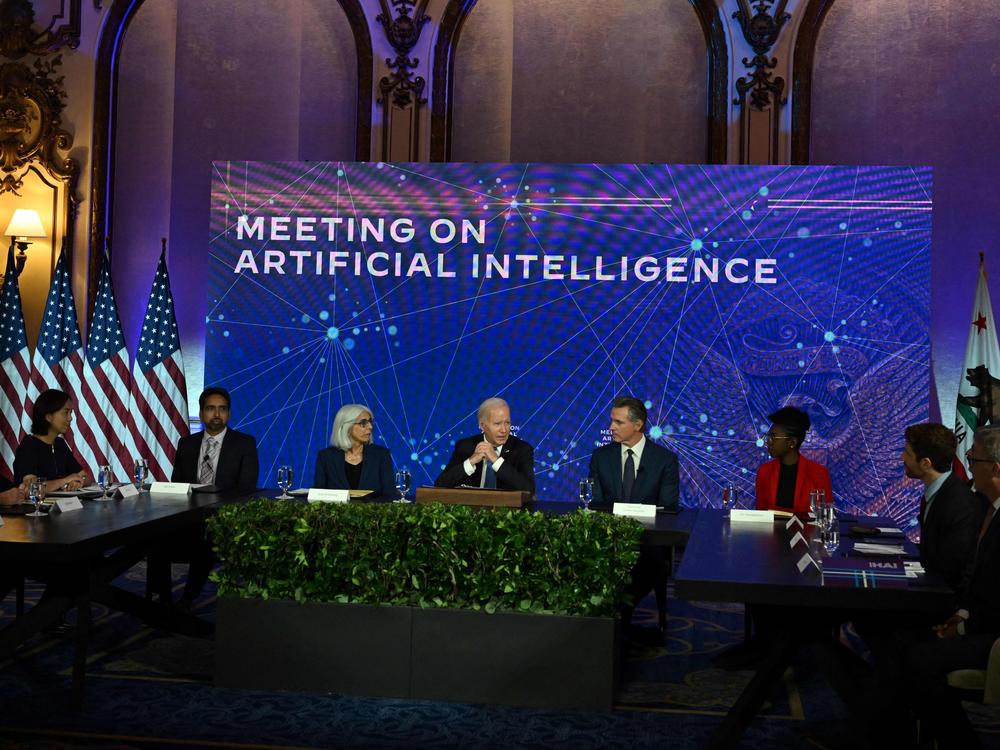Section Branding
Header Content
The White House and big tech companies release commitments on managing AI
Primary Content
Presidents and CEOs from leading tech companies that are creating artificial intelligence have agreed to several commitments on sharing, testing and developing new AI technology, the White House says.
Seven companies — Google, Microsoft, Meta, Amazon, OpenAI, Anthropic and Inflection — will meet at the White House Friday to announce the voluntary agreements. President Biden will also be making remarks.
"U.S. companies lead the world in innovation, and they have a responsibility to do that and continue to do that, but they have an equal responsibility to ensure that their products are safe, secure and trustworthy," White House chief of staff Jeff Zients told NPR in an interview.
But there isn't an exact outline for how the White House can hold the companies accountable if they don't meet the commitments.
"We will use every lever that we have in the federal government to enforce these commitments and standards. At the same time, we do need legislation," Zients said.
White House officials say they're working closely with Congress as they develop AI legislation that would regulate the technology, as well as working on executive actions that will be announced in the coming weeks.
What are in the commitments?
The commitments from tech companies are about information sharing, testing and transparency with both the government and the public. But there aren't many details offered in Friday's announcement.
For example, there's a commitment to develop mechanisms so that users will know when content is generated by artificial intelligence, through a watermark. Companies also said they would make a point to avoid bias and discrimination, and protect privacy.
Companies have also committed to having their AI systems tested through a third party before being released. One example of that will take place at the DEF-CON hacking convention in Las Vegas next month. Some of the companies, including Google and OpenAI, will have their AI systems tested there, at the encouragement of the White House. Beyond that, there isn't a clear outline of who the third-party checks would be, and how they are selected.
But the White House says these agreements are just a first step.
"The commitments the companies are making are a good start, but it's just a start," Zients said. "The key here is implementation and execution in order for these companies to perform and earn the public's trust."
Critics say big tech companies should not be the center of the conversation
Some AI experts have expressed concern about big tech companies being at the forefront of the conversation on regulating AI.
The White House has also been holding listening sessions with civil rights leaders and union leaders on how AI impacts their work.
But Ifeoma Ajunwa, a law professor at Emory who studies the intersection of technology and work, said she's found it disappointing that those who have a financial stake in AI development have been at the forefront of the White House's announcements on AI.
"We also want to ensure that we are including other voices that don't have a profit motive," she said. "We should definitely invite corporate leaders and tech titans to be part of this conversation, but they should not be leading the conversation."
There are also concerns that centering bigger, more established companies in the new agreements could give those businesses a leg-up, while stifling smaller companies that are just starting out.
"The bigger established firms can kind of game it to benefit them, and the newcomers don't have a say," said Victor Menaldo, a political economy professor at the University of Washington. "Big companies love to do these kind of things because they're already established, so they're like, 'Oh, the rules of the road are going to benefit us.' "
On a call with reporters Thursday, White House officials did not confirm whether new companies would be joining onto the agreements, in addition to the seven that have signed on.
"We expect that other companies will see how they also have an obligation to live up to the standards of safety security and trust. And they may choose — and we welcome them choosing — joining these commitments," a White House official said.
Copyright 2023 NPR. To see more, visit https://www.npr.org.

